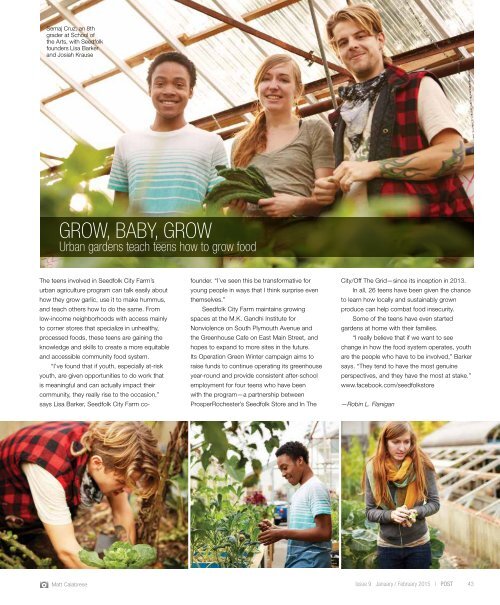You also want an ePaper? Increase the reach of your titles
YUMPU automatically turns print PDFs into web optimized ePapers that Google loves.
Semaj Cruz, an 8th<br />
grader at School of<br />
the Arts, with Seedfolk<br />
founders Lisa Barker<br />
and Josiah Krause<br />
Grow, baby, grow<br />
Urban gardens teach teens how to grow food<br />
The teens involved in Seedfolk City Farm’s<br />
urban agriculture program can talk easily about<br />
how they grow garlic, use it to make hummus,<br />
and teach others how to do the same. From<br />
low-income neighborhoods with access mainly<br />
to corner stores that specialize in unhealthy,<br />
processed foods, these teens are gaining the<br />
knowledge and skills to create a more equitable<br />
and accessible community food system.<br />
“I’ve found that if youth, especially at-risk<br />
youth, are given opportunities to do work that<br />
is meaningful and can actually impact their<br />
community, they really rise to the occasion,”<br />
says Lisa Barker, Seedfolk City Farm cofounder.<br />
“I’ve seen this be transformative for<br />
young people in ways that I think surprise even<br />
themselves.”<br />
Seedfolk City Farm maintains growing<br />
spaces at the M.K. Gandhi Institute for<br />
Nonviolence on South Plymouth Avenue and<br />
the Greenhouse Cafe on East Main Street, and<br />
hopes to expand to more sites in the future.<br />
Its Operation Green Winter campaign aims to<br />
raise funds to continue operating its greenhouse<br />
year-round and provide consistent after-school<br />
employment for four teens who have been<br />
with the program—a partnership between<br />
ProsperRochester’s Seedfolk Store and In The<br />
City/Off The Grid—since its inception in 2013.<br />
In all, 26 teens have been given the chance<br />
to learn how locally and sustainably grown<br />
produce can help combat food insecurity.<br />
Some of the teens have even started<br />
gardens at home with their families.<br />
“I really believe that if we want to see<br />
change in how the food system operates, youth<br />
are the people who have to be involved,” Barker<br />
says. “They tend to have the most genuine<br />
perspectives, and they have the most at stake.”<br />
www.facebook.com/seedfolkstore<br />
—Robin L. Flanigan<br />
Matt Calabrese<br />
Issue 9 <strong>January</strong> / <strong>February</strong> <strong>2015</strong> | <strong>POST</strong> 43


